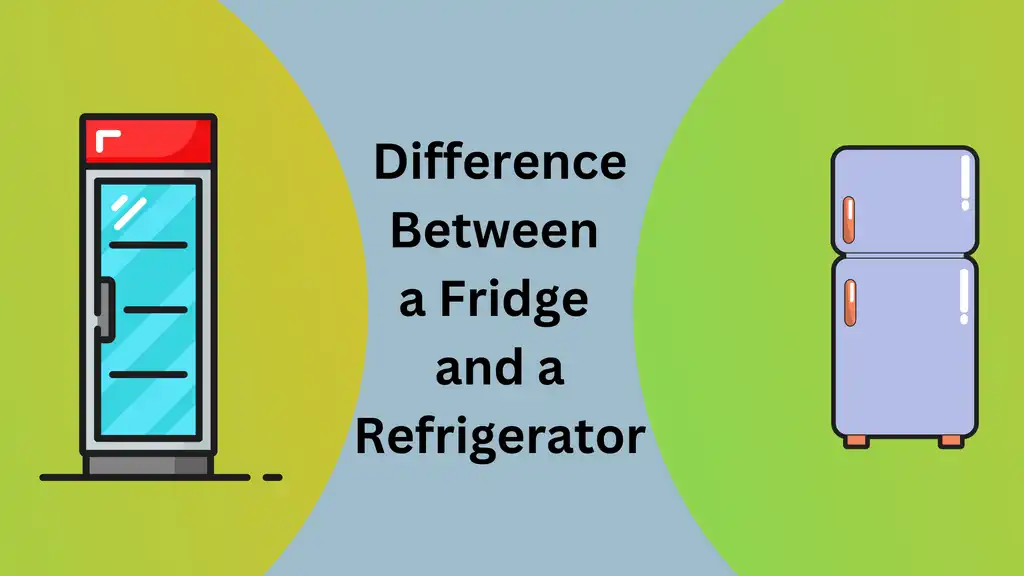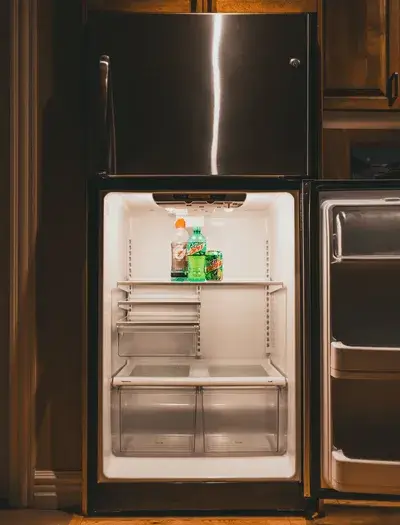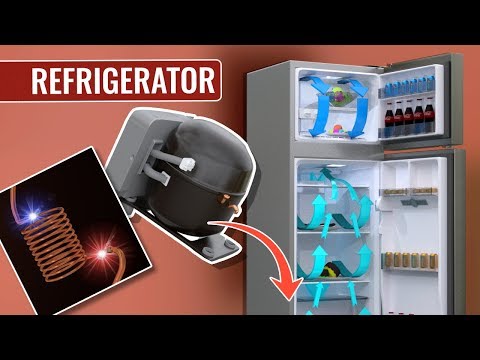Refrigerators and fridges, while often used interchangeably, are not the same. They both cool and preserve items but refrigerators include a freezer and have more advanced features. Their design and functionality also differ.
This guide will compare and contrast fridges and refrigerators (refrigerator vs fridge), helping you identify your home appliance or choose a new one for your kitchen.
Continue reading to learn the difference between a fridge and a refrigerator.
Table Of Contents
- Understanding the Terminology – Fridge vs Refrigerator
- Key Differences Between Refrigerators and Fridges
- Features and Advantages of Refrigerators
- Features and Advantages of Fridges
- Energy Efficiency Between Fridge and Refrigerator
- Refrigerator VS Fridge – Which One is Right for You?
- Refrigerator VS Fridge-Freezer – Key Differences
- Frequently Asked Questions
- Final Thoughts

Understanding the Terminology – Fridge vs Refrigerator
- Fridge is a shortened term for a refrigerator.
- Refrigerator is the formal term often found in user manuals.
Both terms refer to an appliance that preserves food and cools drinks. The difference between “fridge” and “refrigerator” lies in the names and usage, not function.
Let’s discover the key differences between a fridge and a refrigerator.
Key Differences Between Refrigerators and Fridges
Refrigerators and Fridges differ in design, function, size, configuration, and unique features. Let’s explore these differences:
Common Types
| Refrigerators | Fridges |
|---|---|
| Most refrigerators come in two different depth styles: standard/full depth and counter depth. There are 5 major types of refrigerators such as, side-by-side, French door, undercounter, top-freezer and bottom-freezer. | Most fridge models commonly seen in malls and restaurants are either single-door freezerless type or with a small freezer compartment at the top. Mini fridges are also very popular today especially in bars, offices and hotels for storing chilled beverages and wine bottles. |
Average Sizes
| Refrigerators | Fridges |
|---|---|
| Refrigerator sizes are usually 24-40 inches wide, 29-36 inches deep, and 62-72 inches tall. Top Freezer Refrigerators are 10 to 22 cubic feet, Side-by-Side Refrigerators are 20 to 29 cubic feet, and French Door Refrigerators are 18 to 32 cubic feet. | Average size is 36 inches length and 24-36 inches width. Mini fridges range from 1.7 to 4.5 cubic feet. They are generally smaller than full-sized refrigerators. |
Features and Functions
| Refrigerators | Fridges |
|---|---|
| Refrigerators are essential for storing perishable items like dairy, produce, meat, and leftovers. They maintain an internal temperature of 40°F / 4°C while the freezer compartment is typically 0°C or -1°C. | Fridges pretty much have the same job too, to keep your foods and beverages cold enough not to rot. However, a fridge is not suitable for preserving meat, fish, poultry or enjoying ice cream in its solid state since it doesn’t reach the freezing temperature in a typical fridge. |
Average Prices
| Refrigerators | Fridges |
|---|---|
| Standard refrigerators can cost anywhere between $500 to $12,000, depending on the brand, style, size and model. Generally, double-door side-by-side refrigerators and French style refrigerators are the most expensive. Nevertheless, luxury standard-size refrigerators such as a Sub Zero could cost anywhere between $18,000 to $56,000. | A standard size fridge with no freezer compartment can cost anywhere between $600 to $2,999 depending on what features you’re eyeing on. On the other hand, the average price of a mini fridge ranges from $150 to $350. |
Energy Consumption
| Refrigerators | Fridges |
|---|---|
| A full-size refrigerator will feed on at least 300 – 800 watts of energy per day and have a starting wattage of 800-1200 watt-hours/day. | Typically, mini fridges use between 70-90 watts of energy and require 280-360 starting watts. An average-sized fridge with no freezer is likely to consume between 100-400 watts. |
Features and Advantages of Refrigerators
Refrigerators have a range of features and advantages that make them an attractive choice for many households. Here are some of the key features of refrigerators:

Refrigerator Features
Refrigerators come with various features to meet different needs and preferences. Here are some standard features of modern refrigerators.
Refrigerator Advantages
Refrigerators offer several advantages, making them an essential appliance in most households. Here are some of the key benefits of refrigerators.
Features and Advantages of Fridges
Fridges have a range of features that make them an attractive choice for many households. Here are some of the key features of fridges:

Fridge Features
Fridges, known as refrigerators, come with various features to meet different needs and preferences. Here are some common features of modern fridges.
Fridge Advantages
Fridges, also known as refrigerators, are essential appliances in most households, and they offer several advantages that make them valuable addition to any home. Here are some of the key benefits of fridges:
Energy Efficiency Between Fridge and Refrigerator
Refrigerators and fridges have similar energy efficiency as they both use a compressor and refrigerant for cooling. They also follow the same energy efficiency standards and regulations.
Energy efficiency of these appliances can be affected by factors like their size, age, insulation quality, and the type of compressor and refrigerant used.
Newer models are generally more energy efficient than older models due to improved technology, design, and stricter energy regulations.
Refrigerator VS Fridge – Which One is Right for You?
When buying a fridge, consider factors like budget, size, style, and features.
Assess if the fridge fits your space, if its style matches your decor, and if you prefer side-by-side, French door, or top-freezer models. Look at features like energy efficiency, storage, and ice and water dispensers.
Lastly, check prices and reviews to get the best value. The choice between a fridge and a refrigerator depends on your preference and what suits your needs.
Refrigerator VS Fridge-Freezer – Key Differences
Wondering about the difference between a ‘fridge-freezer’, ‘refrigerator’, and ‘freezer’?
A refrigerator has a ‘fridge’ section for snacks, drinks, and fresh food, and a ‘freezer’ section for raw meat and fish.
A fridge-freezer combines both and is budget-friendly.
Frequently Asked Questions
Fridge, on the other hand, is a shortened and altered form of refrigerator, first used in 1926.
Final Thoughts
We have clarified the terms ‘fridge’ and ‘refrigerator’.
We’ve learned that fridges and refrigerators differ in size, capacity, and features. Fridge is smaller, portable while refrigerator is larger, more powerful, and ideal for family usage. Refrigerators are more feature-rich and energy-efficient, but costlier and require more maintenance.
Now you can confidently explain the difference between a fridge and a refrigerator. Remember these tips, enjoy your cold drinks and fresh food. Keep solving everyday mysteries. Until next time, happy refrigerating!
